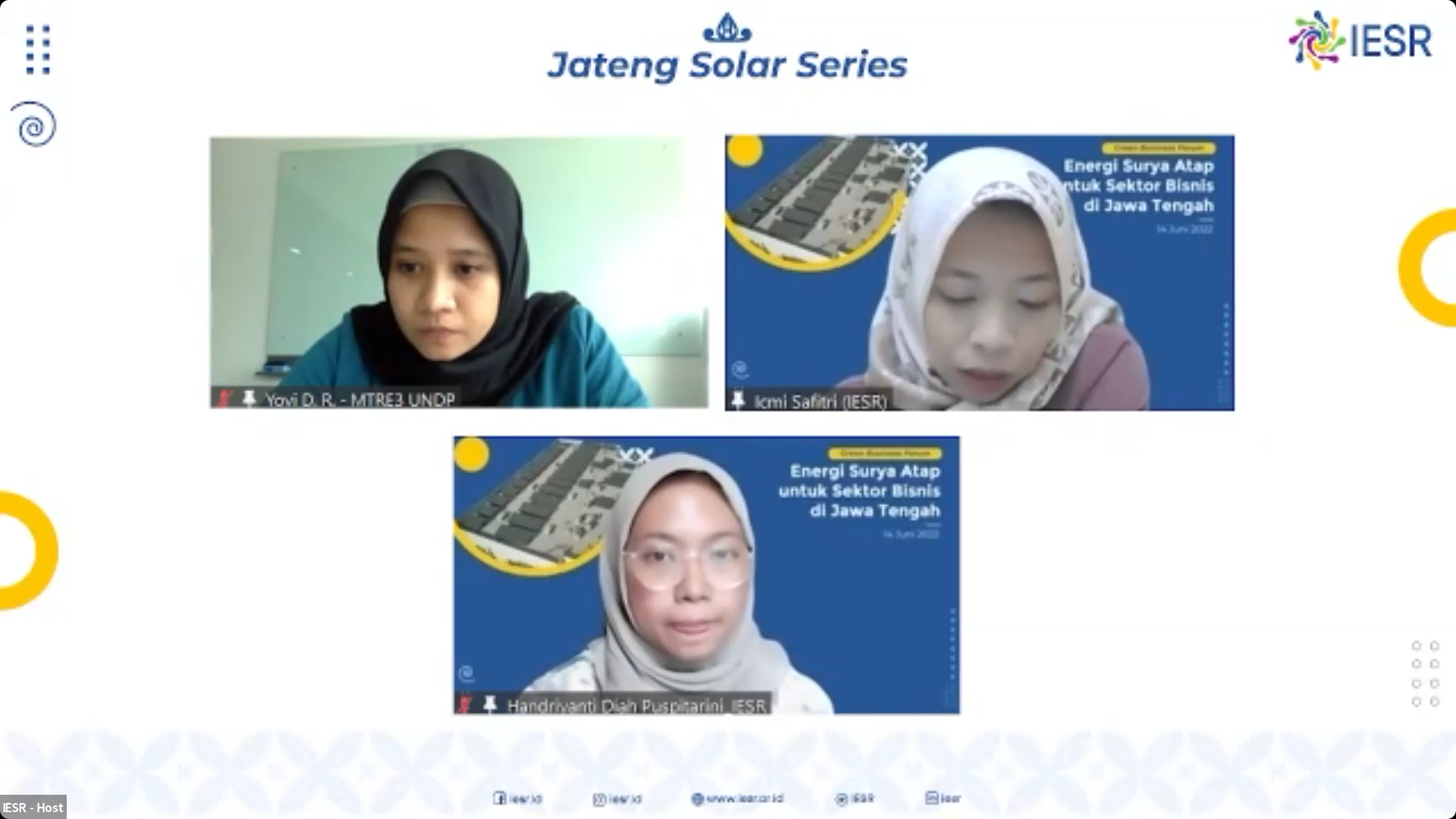Semarang, June 14, 2022 – The growing popularity of the climate change issue and environmental sustainability is slowly affecting people’s consumption and spending patterns in various fields from household needs to tourism. A global survey conducted by The Economist shows an increase in spending on sustainable products from year to year from 2016 – 2020. Not only about the product materials/materials that are used as a reference, but also the emissions generated during production. Energy use is a crucial factor that determines the sustainability of a product/service.
Handriyanti Diah Puspitarini, a senior researcher at the Institute for Essential Services Reform, explained that if a business entity uses renewable energy such as rooftop solar panels, there will be three benefits at the same time.
“There are three benefits that can be obtained simultaneously by using rooftop PV, namely energy efficiency, increased reputation (branding) through sustainable business practices, and operational cost savings, which means that the profit obtained will be maximized,” explained Handriyanti.
Handriyanti continued, Indonesia has enormous solar energy potential reaching more than 7,000 GW. In Central Java itself, there is a market potential of 9.8% early followers and early adopters in the business and commercial sectors.
“This group (early followers and early adopters) is a group who already has basic information about rooftop PV, and wants to install it but still needs to be given more comprehensive information and given more attractive financing options such as installment schemes with long tenors and competitive interest,” she said.
Head of the Central Java Energy and Mineral Resources Office, Sujarwanto Dwiatmoko, expressed his support for the business, tourism agency and hotels that are committed to using clean energy, reducing water usage and doing energy efficiency systematically.
“This support and appreciation will be in the form of a certificate that we will hand over to businesses that systematically perform resource efficiency (energy and water) as well as those who install rooftop PV or use renewable energy,” he explained.
Local supermarket network, Aneka Jaya, has seen electricity bill savings of 50-60% per month after installing a rooftop solar power plant in one of its self-service units.
“Due to the pandemic, we have to find ways to be more efficient, one of which is reducing electricity bills. After we found out about PV rooftop, we started surveys and looking for vendors,” explained Indaru Imam Susilo, manager of Aneka Jaya Kalipancur.
Imam continued that his party took a performance-based renting financing scheme in which he did not issue an initial investment, but paid monthly based on the energy produced for 15 years (according to the agreed contract).
Cahyo Danu Sukmo, Sub Coordinator of Tourism Business Development, Youth, Sports and Tourism Office of Central Java Province, said that currently the tourism sector, especially in Central Java, is moving towards sustainable tourism, means the tourism activity is not exploitative and prioritizes the empowerment of local communities.
“We are also starting to focus on developing tourist villages with green tourism guidelines, including following the energy supply guidelines,” explained Cahyo.
The government through the Ministry of Energy and Mineral Resources keeps encouraging the use of renewable energy, especially rooftop PV in various sectors. Solar energy has even been included in the national strategic program to pursue the renewable energy mix target of 23% by 2025.
“One of our supports is through the latest policy, namely the Minister of Energy and Mineral Resources Regulation No. 26/2021 which regulates PLN customers who install rooftop PV,” said Mustaba Ari Suryoko, Coordinator of Business Supervision Services for Various New Energy and Renewable Energy, Directorate General of EBTKE, Ministry of Energy and Mineral Resources.
Although until now the implementation of the Minister of Energy and Mineral Resources Decree 26/2021 is still facing obstacles, Mustaba stated that his party continues to evaluate and find a win-win solution so that the regulation can be implemented.
Mustaba also stated that his party is collaborating with the United Nations Development Program (UNDP) to provide incentives for rooftop PV new customers through Sustainable Energy Funds (SEF) grants.
Yovi Rahmawati, from UNDP, explained that this grant is valid for new rooftop PV customers, who start installing in November 2021.
“This program itself is still running until November 2022, the application is submitted via the website and the team will verify it,” said Yovi.

